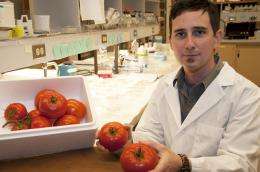SFU student researches fungi fighting controls

(PhysOrg.com) -- If Andrew Wylie achieves his goal -- to use fungi to fight fungi on diseased organic greenhouse vegetables -- there’ll likely be a lot of growers giving him thanks on a future Thanksgiving weekend.
Wylie is a Simon Fraser University doctoral student in biology professor Zamir Punja’s plant pathology lab. He is on a quest to create a toolbox of biological controls that will help both organic and conventional commercial greenhouse vegetables thrive.
Wylie is researching how to use the biocontrol fungus Gliocladium catenulatum to control other fungi that spoil or kill five to 50 per cent of commercial greenhouse tomatoes and cucumbers in North America. These vegetables are Canada’s $1.2 billion commercial organic and conventional greenhouse industries’ most valuable crops.
“Gliocladium catenulatum is considered a biological control fungus because it can either directly kill, outcompete or inhibit the growth of others,” says Wylie, the son of specialty mushroom growers. He developed an early fascination with the good and the bad sides of fungi.
Wylie is in partnership with Origin Organic Farms, the industry leader in the field of certified organic greenhouse production.
“Our lab is doing extensive work on how the airborne spores of Penicillium fungus damage greenhouse tomatoes and how the waterborne fungus, Pythium, strangles cucumbers. We need to figure out how these fungi infect and cause disease in their hosts before we can turn to Gliocladium catenulatum as a tool for attacking its fellow fungi.”
While one type of Penicillium produces an antibiotic useful to humans, another shows up as unappealing black spots on harvested tomatoes. Pythium causes a crown rot that girdles cucumbers, cutting off their nutrients and making them vulnerable to other diseases.
Wylie worries that the commercial greenhouse industries’ slim profit margins will tempt growers to take two steps backwards in what has become an industry-wide trend to go organic.
“Of concern to me is that these diseases could be prevented using synthetic fungicides,” says Wylie, who helped develop the technology that enables organic growers to compete with their hydroponic cousins.
“It is important to control tomato — and cucumber — attacking fungi and other greenhouse attackers by better understanding their causes and progression so that organic controls have a fighting chance. By doing this more difficult work now, the momentum of the organic movement is maintained and we build a toolbox of sustainable solutions to use in the future.”
Wylie notes that controlling disease-causing fungi with naturally occurring microbes is an important tool for organic growers who want to maintain their certification. But he adds that conventional hydroponic growers are turning to organic controls because they are less damaging to the environment and can be less costly than synthetic pesticides.
Provided by Simon Fraser University




















